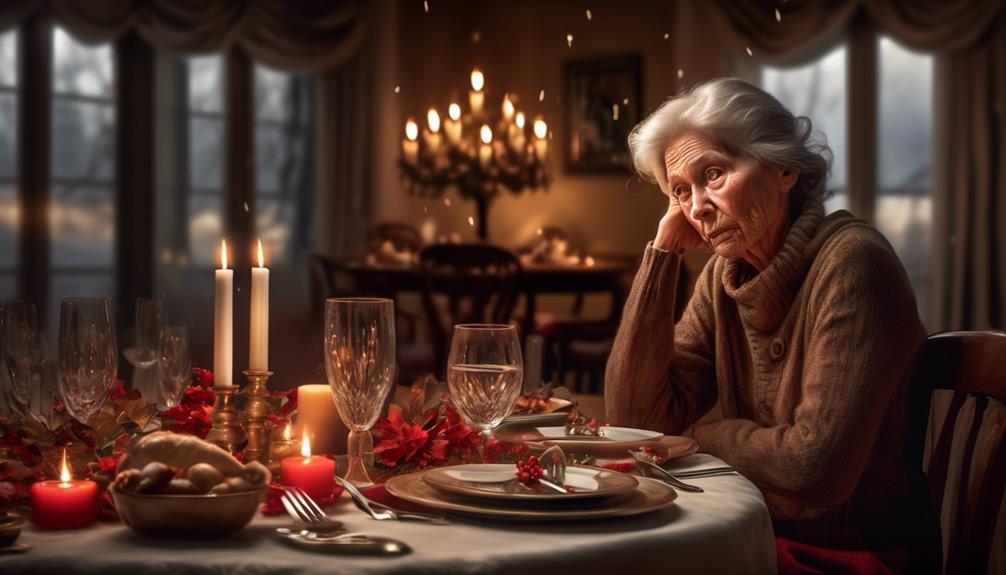Experiencing grief during the holiday season can feel like trying to find a way out of a complex labyrinth of emotions. Even though the festive lights are glowing, the weight of loss might be too much to bear. Yet, there is hope in sharing tales of resilience and healing.
Our journey through grief is not a solitary one; it is a path we walk together, finding solace in each other's experiences and discovering strength in our vulnerability.
Let's explore how our individual narratives of loss and love intertwine, shaping the way we navigate this challenging season.
Key Takeaways
- Engage in symbolic gestures for comfort and connection.
- Create meaningful tributes to honor loved ones.
- Acknowledge and embrace complex emotions.
- Prioritize self-care and seek support from others.
My Personal Experience With Grief
In the midst of holiday cheer and festivities, my world was suddenly shattered by the unexpected loss of my father. Grief engulfed me, and as the holiday season unfolded, the clash between the external merriment and my internal turmoil was overwhelming. Navigating traditions without my father felt surreal, each moment a painful reminder of his absence. Coping with grief during this time seemed like an insurmountable task.
However, surrounded by loved ones, I found solace. Sharing my emotions and seeking support became my lifeline. Their understanding and empathy helped me process my grief, offering a beacon of light in the darkness. Together, we honored my father's memory, weaving his presence into our celebrations in meaningful ways. Through tears and laughter, we found moments of healing amidst the pain.
The journey of processing grief during the holiday season was arduous, but with the unwavering support of family, I began to see glimpses of hope and resilience.
Strategies for Coping During Holidays

During the holidays, it can be beneficial to engage in symbolic gestures such as lighting a candle in honor of your loved one to aid in coping with grief. Creating new traditions that incorporate your loved one's memory can also provide comfort and a sense of connection during this special time. Remember, it's okay to allow yourself to grieve and seek comfort in ways that feel right for you.
Reach out to family and friends for support when needed, as they can be a source of strength and understanding. If paranormal experiences bring solace and help you feel connected to your loved one, embrace them. Grief is a normal response to loss, and honoring your emotions during the holiday season is crucial for healing.
Honoring Memories and Celebrating Life
Let's honor cherished memories and celebrate the life of our loved ones during the holiday season by creating meaningful tributes and incorporating their presence into our traditions. It's a time to feel the warmth of memories as we find comfort in honoring those who are no longer with us. One way to do this is by creating a memory box filled with mementos and photos that remind us of special moments shared with our family member.
Lighting a candle in their honor can serve as a beautiful tribute, bringing their spirit into our celebrations.
Visiting the cemetery to decorate the grave with holiday decorations can be a comforting way to keep the memory alive and feel connected to our loved ones. Additionally, dedicating a Chanukah candle in their memory or starting a new tradition like having someone different carve the turkey at holiday gatherings can be a meaningful way to celebrate their life and incorporate their presence into our festivities.
Seeking Support and Understanding

Navigating grief during the holidays can feel overwhelming, but seeking support from understanding friends and family members is crucial for coping effectively. It's essential to express your feelings openly and honestly to those around you. Here's how you can seek support and understanding during this challenging time:
- Communicate Your Needs: Let people know how they can best support you.
- Validate Your Emotions: Recognize and accept your feelings of grief as valid and seek validation from others.
- Be Yourself: Surround yourself with individuals who encourage you to be true to yourself.
- Accept Love and Support: Allow yourself to lean on the love and support of those who care about you.
- Set Realistic Expectations: Understand that the first Christmas without your loved one may be tough, and it's okay to take care of yourself as you move forward.
Navigating Emotions and Challenges
Understanding the complex and individual process of navigating emotions and challenges during the holidays after experiencing the death of a loved one is crucial for effective coping. The holidays can evoke a range of emotions, from sadness and loneliness to nostalgia and joy, making the grieving experience more intricate. Traditions, memories, and festivities without the people who love us can intensify feelings of grief and loneliness, reminding us of our sense of loss. Coping with grief during this time may involve conflicting emotions, where we desire to participate in celebrations yet find them unbearably painful.
During this challenging period, finding comfort and support from others becomes essential. It's okay to feel a mix of emotions and to seek understanding from those around us. Embracing the journey of navigating grief during the holidays as a personal and evolving experience can require patience, self-compassion, and the willingness to lean on the support of loved ones. Remember, it's okay to take things one step at a time and to prioritize self-care as you navigate these emotions and challenges.
Frequently Asked Questions
How Do You Process Grief During the Holidays?
We process grief during the holidays by acknowledging our emotions, engaging in comforting rituals, and allowing ourselves to feel without judgment. Seeking support from loved ones and reflecting on memories can help navigate this challenging time.
It's important to honor our feelings of sadness, anger, and joy as we find ways to incorporate our loved one's presence. Remembering that it's okay to grieve and seek comfort from those around us is essential during the holiday season.
What Are the 3 C's of Grief?
When facing grief, it's crucial to understand the 3 C's: Chaos, Confusion, and Change.
Chaos brings a storm of overwhelming emotions, while Confusion clouds our minds and decision-making.
Change marks the evolution as we adapt to life without our loved ones.
Recognizing these stages helps validate our feelings during mourning. It's a vital journey towards healing and growth.
Do People With ADHD Grieve Differently?
Yes, people with ADHD may grieve differently due to their unique neurodevelopmental characteristics. ADHD can impact how individuals process and express emotions, potentially leading to challenges in coping with grief. Difficulty regulating emotions and managing stress during the grieving process is common.
Symptoms like impulsivity and distractibility can affect navigating the stages of grief. Tailoring support and coping strategies to account for these factors can be beneficial for individuals with ADHD.
What Are the 5 Stages of Grief?
Absolutely, the 5 stages of grief, as outlined by Elisabeth Kübler-Ross, are Denial, Anger, Bargaining, Depression, and Acceptance.
These stages provide a roadmap for understanding the emotional journey individuals undergo after a loss.
It's important to note that not everyone experiences these stages in a linear fashion. Grief is unique to each person, and these stages can overlap or repeat.
Recognizing these stages helps validate and navigate our emotions during the grieving process.
Conclusion
In conclusion, as we navigate the holiday season while coping with grief, let's remember that it's okay to feel a range of emotions and seek support when needed.
Embracing new traditions and honoring the memories of our loved ones can bring comfort and healing during this challenging time. Remember, we aren't alone in our grief, and together we can find strength and solace in each other's presence.
Let's hold onto hope and cherish the moments we shared with those we've lost.









